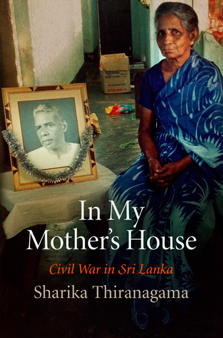Ilankai Tamil Sangam28th Year on the Web Association of Tamils of Sri Lanka in the USA |
|||
 Home Home Archives Archives |
In My Mother's HouseCivil War in Sri Lankaby Sharika Thiranagama, University of Pennsylvania Press, September 2011
Sharika Thiranagama's In My Mother's House provides ethnographic insight into two important groups of internally displaced people: northern Sri Lankan Tamils and Sri Lankan Muslims. Through detailed engagement with ordinary people struggling to find a home in the world, Thiranagama explores the dynamics within and between these two minority communities, describing how these relations were reshaped by violence, displacement, and authoritarianism. In doing so, she illuminates an often overlooked intraminority relationship and new social forms created through protracted war. In My Mother's House revolves around three major themes: ideas of home in the midst of profound displacement; transformations of familial experience; and the impact of the political violence—carried out by both the Tamil Tigers and the Sri Lankan state—on ordinary lives and public speech. Her rare focus on the effects and responses to LTTE political regulation and violence demonstrates that envisioning a peaceful future for post-conflict Sri Lanka requires taking stock of the new Tamil and Muslim identities forged by the civil war. These identities cannot simply be cast away with the end of the war but must be negotiated anew. Sharika Thiranagama teaches anthropology at the New School for Social Research in New York. She is coeditor of Traitors: Suspicion, Intimacy, and the Ethics of State-Building, also available from the University of Pennsylvania Press. Gananath Obeyesekere is Professor Emeritus of Anthropology at Princeton University. 320 pages | 6 x 9 | 2 illus.
| ||
 In May 2009, the Sri Lankan army overwhelmed the last stronghold of the Liberation Tigers of Tamil Eelam—better known as the Tamil Tigers—officially bringing an end to nearly three decades of civil war. Although the war has ended, the place of minorities in Sri Lanka remains uncertain, not least because the lengthy conflict drove entire populations from their homes. The figures are jarring: for example, all of the roughly 80,000 Muslims in northern Sri Lanka were expelled from the Tamil Tiger-controlled north, and nearly half of all Sri Lankan Tamils were displaced during the course of the civil war.
In May 2009, the Sri Lankan army overwhelmed the last stronghold of the Liberation Tigers of Tamil Eelam—better known as the Tamil Tigers—officially bringing an end to nearly three decades of civil war. Although the war has ended, the place of minorities in Sri Lanka remains uncertain, not least because the lengthy conflict drove entire populations from their homes. The figures are jarring: for example, all of the roughly 80,000 Muslims in northern Sri Lanka were expelled from the Tamil Tiger-controlled north, and nearly half of all Sri Lankan Tamils were displaced during the course of the civil war.